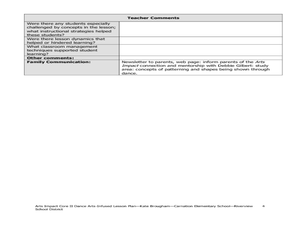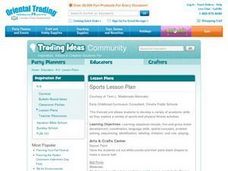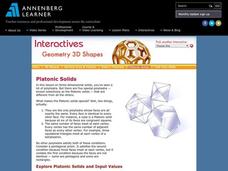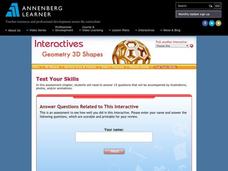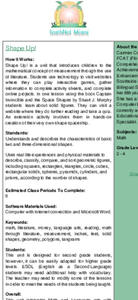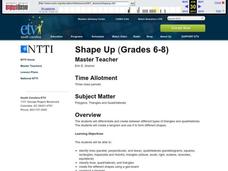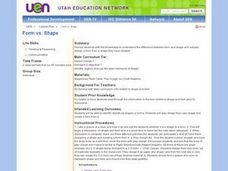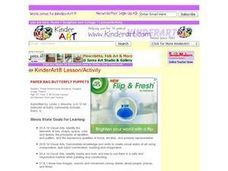Curated OER
Worksheet 13: Clothes, Shapes, Parts of the Body
In this clothing words instructional activity, students analyze 5 picture clues and sentences, and for each, cross out the word that is incorrect in each set of parentheses. Each picture/sentence pair pertains to shapes or articles of...
Curated OER
Dancing Polygons and Non-Polygons with Patterns
Second graders study movements. In this dance lesson, 2nd graders draw patterns selecting one to represent through movement with their body.
Curated OER
Around the Bend
Young scholars examine the art elements of the Inca "Large Jug." In this visual art lesson, students identify the colors, pattern, and shape of the Inca "Large Jug." Young scholars then draw a design on a flat and curved surface and...
Curated OER
Sports Lesson Plan
Have your class participate in a variety of sports and craft activities using this resource. With sports as the theme, learners work on art projects. Students create soccer ball prints, a three dimensional football, and a sports collage.
Curated OER
Madeline Coloring Sheet
Young artists draw a picture of what magical things can were seen in Washington D.C. while traveling along a magic tide.
Curated OER
Plaster Sculpture – subtractive method
Practice the subtractive sculpture process with your class. They'll discuss the subtractive method, art form and space, then design a sculpture which they will create from a block of plaster. Technical instructions are included.
Newberry Elementary School
Kindergarten Worksheet
Give a kindergarten resource sheet to the parents in your classroom to help them track their kids' progress. Activities that kindergartners should master include identifying letters of the alphabet, numbers, colors, shapes, and parts of...
Annenberg Foundation
Geometry 3D Shapes: Platonic Solids
From polyhedrons to platonic solids, here is a lesson that will have your classes talking! As an introduction to platonic solids, scholars cut and fold nets to create the three-dimensional solids. They use an interactive component to...
Annenberg Foundation
Geometry 3D Shapes: Euler's Theorem
How do you get a theorem named after you? Euler knows what it takes! The third lesson of five asks pupils to use an interactive activity to compare the faces, vertices, and edges of seven different three-dimensional solids. They use...
Curated OER
A Sign of Their Times
Young scholars identify the social climate that created the terms Degenerative Art and Fascist Aesthetic. They also identify how and why certain artists' artwork fell into these categories. Students recognize and discuss the...
Annenberg Foundation
Geometry 3D Shapes: Surface Area and Volume
Whether you wrap it or fill it, you're using geometric concepts. Classmates use an interactive approach to learn how to find volume and surface area of cylinders and prisms in the second lesson in a five-part series. The online lesson...
Annenberg Foundation
Geometry 3D Shapes: Test Your Skills
Time to find out what they've learned! The final lesson of a five-part series has learners complete a 39-question multiple choice review. They use what they've learned in the previous lessons to complete questions that include concepts...
Jackson Public Schools
Summer Reading Activities
Provide parents with the tools they need to bridge the summer learning gap with this collection of fun activities. Whether it's creating an alphabet poster with illustrations for each letter, playing a game of sight word concentration,...
Curated OER
Shape Up!
Students investigate measurement through the use of literature through this series of lessons.
Curated OER
Recognize Triangles
In this shapes worksheet, learners are asked to "colour" all of the triangles they find on the page. There are 10 shapes on the page and 4 are triangles. The second page contains suggestions for teachers on activities with 2-D shapes.
Curated OER
Shape Up
Middle schoolers explore differents types of triangles and quadriaterals. In this polygon lesson, students model identify and compare two and three dimensional geometric figures. Middle schoolers create tangrams and discover the...
Curated OER
Investigating Tessellations in 2 Dimensions
Students analyze tessellations. In this geometry lesson, students discover which shapes can or cannot be used to create a tessellation. Students watch a video, then create their own tessellations.
Curated OER
Cutting Positive and Negative SYMMETRICAL SHAPES
Young scholars cut intricate symmetrical shapes on the fold. Also, they identify positive and negative shapes and warm, cool and neutral colors. Finally, they glue shapes to create a pleasing design.
Curated OER
Geometric Shapes at the OK Corral
Students explore regular geometric shapes. In this shapes lesson, students investigate geometric shapes in the world around them. Students differentiate between regular and irregular shapes.
Curated OER
Shape & Form
Students analyze the difference between shape and form. They identify, explain and use the basic elements of design and determine that forms are three-dimensional and shapes are two-dimensional. They sketch it on their paper and then...
Curated OER
Interior Design: Form Vs. Shape
Learners discover the difference between form and shape as it pertains to interior design. After identifying objects as either shapes or forms, they design their own shapes and give them form. Activities include creating shapes and...
Curated OER
"Zigzag"
Students listen to the book "Zigzag" by Robert D. San Souci, and examine the concepts of friendship, respect, and determination. They answer story comprehension questions, then create a fabric doll using the shapes from the book.
Curated OER
Paper Bag Butterfly Puppets
Whether you're using it to tell stories, explore the letter b, or during a life science lesson plan, these butterfly puppets will be a hit. Youngsters use crayons, tissue paper, and paper bags to create butterfly puppets.
Dick Blick Art Materials
“Rhythm in Layers”
Young artists learn to build rhythm into a design by repeating colors, shapes, and patterns in a 3-D sculpture activity.

